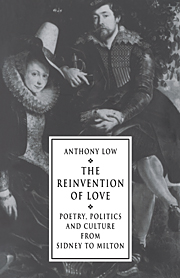Book contents
- Frontmatter
- Contents
- Preface
- Introduction
- 1 Sir Philip Sidney: “huge desyre”
- 2 John Donne: “Defects of lonelinesse”
- 3 John Donne: “the Holy Ghost is amorous in his Metaphors”
- 4 George Herbert: “the best love”
- 5 Richard Crashaw: “love's delicious Fire”
- 6 Thomas Carew: “fresh invention”
- 7 John Milton: “Because wee freely love”
- 8 John Milton: “Haile wedded Love”
- Conclusion
- Notes
- Index
8 - John Milton: “Haile wedded Love”
Published online by Cambridge University Press: 02 October 2009
- Frontmatter
- Contents
- Preface
- Introduction
- 1 Sir Philip Sidney: “huge desyre”
- 2 John Donne: “Defects of lonelinesse”
- 3 John Donne: “the Holy Ghost is amorous in his Metaphors”
- 4 George Herbert: “the best love”
- 5 Richard Crashaw: “love's delicious Fire”
- 6 Thomas Carew: “fresh invention”
- 7 John Milton: “Because wee freely love”
- 8 John Milton: “Haile wedded Love”
- Conclusion
- Notes
- Index
Summary
It is well known that Milton had an immense influence on the thinking of later poets, and indeed on that of politicians, opinion leaders, and people generally, on the subject of love and companionate marriage. During the eighteenth century, his hymn to marriage in Paradise Lost, “Haile wedded Love,” was repeatedly detached from its context: to be quoted, paraphrased, set to music, and variously alluded to, by numberless people. Even Voltaire, who was scornful of Paradise Lost on the whole, speaks well of Milton as a benign authority on the subject of love, praising him for removing “with a chaste Hand the veil which covers everywhere the enjoyments of that Passion. There is Softness, Tenderness and Warmth without Lasciviousness, the Poet transports himself and us, into that State of innocent Happiness in which Adam and Eve continued for a short time.”
At the same time, Milton the tender advocate of marriage suffered an equally wide-ranging notoriety as “the Great Divorcer.” On the Continent especially, but also among his English political opponents, he was widely known, or misknown, as a divorcer, a polygamist, and a frightening advocate of unlimited libertinism. According to Robert Baillie (1645), Milton “in a large Treatise hath pleaded for a full liberty for any man to put away his wife, when ever hee pleaseth, without any fault in her at all, but for any dislike or dyspathy of humour.”
- Type
- Chapter
- Information
- The Reinvention of LovePoetry, Politics and Culture from Sidney to Milton, pp. 178 - 201Publisher: Cambridge University PressPrint publication year: 1993



